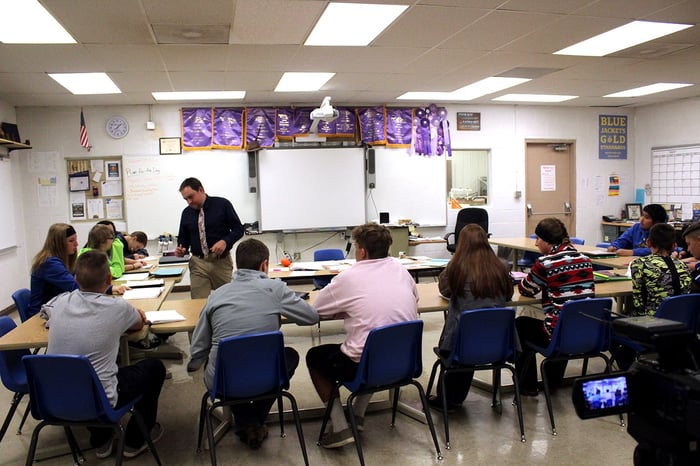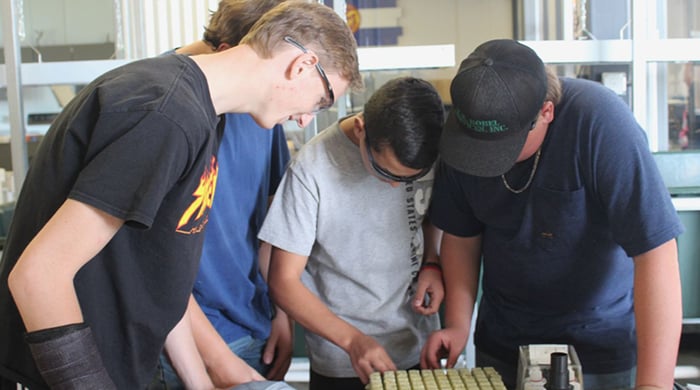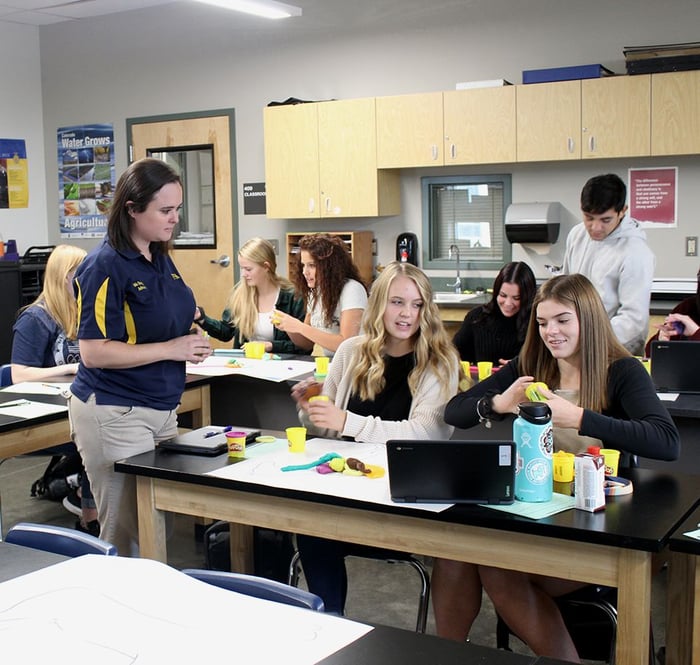CTE Curriculum
Prepare learners with CTE curriculum aligned to industry standards.
Case Study
Industry Certifications Prepare Students to Contribute to Local Economy
For the past several years, the Colorado economy has been ranked among the best in the nation by the U.S. News & World Report. To determine the placing, the U.S. News & World Report considers a variety of factors, including GDP growth, unemployment rates, new businesses, patents and migration to the state. Colorado has achieved this distinction due to its economic diversity. In particular, the agricultural and manufacturing industries have spurred the Colorado economy to its place as a national leader.
According to the Colorado Department of Agriculture, the agriculture industry employs nearly 173,000 residents and contributes 41 million dollars to the state economy. Based on reports from the Colorado Office of Economic Development and Trade, the manufacturing industry accounts for more than seven million in international exports alone and employs more than 100,000 workers. While these industries are not the only integral sectors to Colorado’s economy, the agricultural and manufacturing sectors are particularly vital to the counties in northern Colorado.
North Park High School
Situated in the middle of the North Park Basin, residents of Walden, Colorado depend on the agricultural and natural resources industry. In Jackson County, the agriculture industry is primarily sustained by cattle and hay production, and according to the 2017 Census of Agriculture, the operations are worth a combined 24.5 million dollars. To prepare students for careers in the agricultural industry, Eric Wellman, agricultural science teacher at North Park High School in Walden, is including industry certifications in his classes.

Wellman has seen the impact earning an industry certification can have on a student’s academic and career success.
“In career and technical education, our focus is to make our students stronger, to make them elite when they enter the workforce, and industry certifications help us to achieve that,” said Wellman.
After earning the Elanco Veterinary Medical Applications Certification, one of Wellman’s students secured a position at a local veterinary clinic while she was still attending North Park. Now a college student, she has surpassed the expectations of her instructors and employers.
“She’s ahead of her class as far as practical skills. Now she’s gaining more technical knowledge, but the industry certification gave her a step-up and allowed her to go work in a vet clinic before she had her degree,” said Wellman.
Along with the Elanco Veterinary Medical Applications Certification, other students in Wellman’s classes have earned the National Horse Judging Team Coaches’ Association Equine Evaluation & Management Certification. This year, Wellman offered his students the opportunity to pursue an industry certification based on their academic and professional interests as part of an independent study program.
A senior at North Park, Destry Schmidt is preparing to take the American Meat Science Association Meat Evaluation Certification. Growing up on his family’s ranch, Schmidt developed a passion for the agricultural industry, particularly cattle production, and wants to manage a ranch in the future. He decided to earn the AMSA Meat Evaluation Certification to prepare him for this goal.
“In the future, when I am managing a ranch, I’m going to try to make the best product possible, and if I know what the best product looks like on the rail, I’ll be able to know what the best product is supposed to look like off the rail,” said Schmidt.
Highland High School
While the remote North Park area is reliant on agriculture for economic sustainability, the more urban town of Ault in Weld County, Colorado is not only supported by a robust agricultural industry, but also by a thriving manufacturing industry. According to Upstate Colorado Economic Development, manufacturing employs the largest portion of Weld County residents.

Within the manufacturing industry, most companies are focused on meat and food processing or metal fabrication and machine production. Along with the growing manufacturing industry, as reported by the 2017 Census of Agriculture, Weld County boasts the top-producing agricultural county in the state, with crop and livestock operations worth two billion dollars.
“The industry certification makes them more employable, and it allows them to further develop their skill set in whatever specific area they have a passion for."
To prepare students to meet the needs of their local industry, the teachers at Highland High School in Ault are using a variety of instructional methods to help their students be competitive in the workforce. Jarrod Bessire, agricultural science instructor, teaches a tailored set of courses to meet the industry-specific needs of local employers.
Combined with agriscience classes, the Highland agricultural science department boasts a robust mechanics program. As a way to capstone his students’ experiences in agricultural science classes, Bessire has begun offering industry certifications to students who wish to validate the knowledge and skills they have learned during their time in the Highland agricultural science program.
“The industry certification makes them more employable, and it allows them to further develop their skillset in whatever specific area they have a passion for,” said Bessire.
Currently, Bessire’s students are preparing to earn the Elanco Fundamentals of Animal Science Certification, the Elanco Veterinary Medical Applications Certification, and the Center for Financial Responsibility Personal Financial Literacy Certification.
Windsor High School
Despite its proximity to the larger cities of Fort Collins, Greeley and Loveland, the counties surrounding Windsor, Colorado are primarily based on the agriculture industry. However, the students of Windsor High School do not come from agricultural backgrounds. To help their students learn more about the agriculture industry, and its specific role to the Windsor area, agricultural science teachers Melinda Spaur and Shannon Baylie offer course pathways designed to help students understand the value of the agriculture industry. “It’s all about helping students realize there is potential to be in the agriculture industry when they graduate from Windsor,” said Baylie.
According to the 2017 Census of Agriculture, there are more than 4,000 agricultural operations in Weld County, and livestock sales account for 83 percent of revenue for these operations. In Larimer County, the 2,000 farming and ranching operations reported 54 percent of production revenue was the result of livestock sales, as disclosed by the 2017 Census of Agriculture. Due to the large number of farming and livestock operations in Weld and Larimer counties, there is a demand for veterinarians and other veterinary medicine professionals in the Windsor area.

To meet this need, Baylie offers two upper-level veterinary medicine courses as part of the animal science pathway. These courses are designed to prepare students for careers in animal or veterinary science, and after the students have completed the pathway, they are given the opportunity to take the Elanco Veterinary Medical Applications Certification exam. Baylie has seen students achieve academic and career success by earning the certification. Many of Baylie’s students have obtained positions at veterinary clinics, worked to attain their veterinary technician or assistant certificates, or attended a four-year university to study animal or veterinary science.
One local veterinary clinic has started an internship with Windsor to help students who earn the certification further expand their knowledge and skills in veterinary medicine and ensure the clinic is staffed by highly trained employees.
Along with the prominence of the livestock production industry in northern Colorado, the floral industry is also an integral part of agriculture’s contribution to the state economy. According to the 2017 Census of Agriculture, the Colorado floriculture industry is worth more than $100 million. Larimer County accounted for nine million in floral sales, and Weld County reported $38 million in sales revenue.
Recognizing the booming floral industry in the northern Colorado area, Windsor offers a floral design class within the plant science pathway. As part of the floral design class, Spaur integrates the Benz School of Floral Design Principles of Floral Design Certification to capstone her students’ experiences within the program to give them tangible, applicable proof of the knowledge and skills they gained in the class.
Several of Spaur’s students have found a passion for floral design while earning the certification. Along with students who have completed further accreditation programs, some of Spaur’s students have attended Colorado State University to major in horticulture. Many local businesses, such as floral shops and supermarkets, have hired Windsor students due to their floral design skills, and one of Spaur’s students started her own floral design business while attending college.

“It’s all about helping students realize there is potential to be in the agriculture industry when they graduate from Windsor."
After taking Spaur’s floral design class, Tori Weber, a senior at Windsor, decided to earn the Benz School of Floral Design Principles of Floral Design Certification because of the passion she had found for floriculture and her desire to pursue a career in the floral industry. After earning the certification, Weber has created arrangements for several events in the Windsor area. In the future, Weber plans to attend cosmetology school, and after obtaining her license, she aims to start a business to provide floral arrangements along with hair and makeup design for weddings and other formal events. Not only will the Benz School of Floral Design Principles of Floral Design Certification allow Weber to diversify her future business operation, but the artistic principles and techniques she learned from the floral design class and verified with the certification will also benefit her during her time in cosmetology school.
Whether a school is in a rural area like North Park, an urban setting like Windsor, or somewhere in between like Highland, earning an industry certification can help students prepare to enter the industries that sustain their local economies. By validating a student’s knowledge and skills, an industry certification can boost employment opportunities by acting as a signal to potential employers of what the student is both interested in and qualified for.
Because they have previous knowledge and training, certification earners are more successful in their positions and offer greater value to their employers. Teachers who include industry certifications relevant to the local economy in their courses are preparing their students for the future by ensuring they are more suitable for work positions than other job applicants. The teachers at North Park, Highland and Windsor are ensuring Colorado will remain a national leader by preparing the future workforce to enter fields essential to the success of the Colorado economy.
COLORADO
About iCEV
Since 1984, iCEV has specialized in providing quality CTE curriculum and educational resources. iCEV is the most comprehensive online resource for CTE educators and students, offering curriculum for several major subject areas, including agricultural science, trade & industrial education, business & marketing, career exploration, family & consumer science, trade & health science, law enforcement and STEM education. iCEV also acts as a certification testing platform for industry certifications. Recognized companies and organizations utilize iCEV as the testing platform for their certifications. Additionally, iCEV offers Eduthings, a CTE data management platform that simplifies reporting for industry certifications, work-based learning, CTSO participation, and more. For more information, visit www.icevonline.com.



